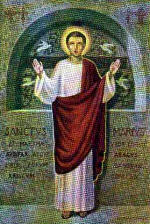Daily Readings for: January 19, 2013
(Readings on USCCB website)
Collect: Attend to the pleas of your people with heavenly care, O Lord, we pray, that they may see what must be done and gain strength to do what they have seen. Through our Lord Jesus Christ, your Son, who lives and reigns with you in the unity of the Holy Spirit, one God, for ever and ever.
RECIPES
ACTIVITIES
PRAYERS
Ordinary Time: January 19th
Saturday of the First Week of Ordinary Time
Old Calendar: Sts. Marius, Martha, Audifax, and Abachum, martyrs; St. Canute, martyr
According to the 1962 Missal of Bl. John XXIII the Extraordinary Form of the Roman Rite, today is the feast of Sts. Marius, Martha, Audivax and Abachum, a group of Roman martyrs of the third century. St. Canute was king of Denmark; he was put to death out of hatred of his faith and his zeal in working for its extension in his kingdom. He was killed in St. Alban's Church in Odense.
The Week of Prayer for Christian Unity
St. Marius and Family
Their feast does not appear in the Roman calendar until the twelfth century. The Acts of these martyrs are wholly legendary. They give the following details. Marius was a Persian of noble extraction. With his wife, who was also noble-born, and his two sons, Audifax and Abachus, he came to Rome during the reign of Emperor Claudius II (268-270) to venerate the graves of the martyrs. They visited the Christians in prison, encouraged them by word and deed, and shared with them their goods. And like Tobias of old, they buried the bodies of the saints.
It was not long before they themselves were arrested; and when neither threats nor allurements could make them offer sacrifice to the idols, they were savagely flogged. Martha was the first to die, but not before she had fervently exhorted her husband and sons to endure steadfastly whatever tortures might be inflicted for the faith. All were beheaded in the same place and their bodies thrown into the fire. Felicitas, a saintly Roman woman, succeeded in recovering the half-burnt bodies and buried them on her estate.
St. Canute
 St. Canute, king of Denmark, was murdered in St. Alban's Church, Odense, July 10, 1086. The Martyrology confuses him with his nephew, St. Canute the Duke, who died on January 7, 1131, and was canonized November 8, 1169, by Pope Alexander III. St. Canute is also called Canute the holy, or Danish Knut, or Knud, Den Hellige, or Sankt Knut, or Knud.
St. Canute, king of Denmark, was murdered in St. Alban's Church, Odense, July 10, 1086. The Martyrology confuses him with his nephew, St. Canute the Duke, who died on January 7, 1131, and was canonized November 8, 1169, by Pope Alexander III. St. Canute is also called Canute the holy, or Danish Knut, or Knud, Den Hellige, or Sankt Knut, or Knud.
The son of King Sweyn II Estrithson of Denmark, Canute succeeded his brother Harold Hen as king of Denmark. Canute opposed the aristocracy and kept a close association with the church in an attempt to create a powerful and centralized monarchy.
In ecclesiastical matters, Canute generously patronized several churches, including the Cathedral of Lund, Denmark's archbishopric; established a Benedictine abbey at Odense; and supported apostolic preaching throughout Denmark. In temporal matters, he attempted an administrative reform, particularly an enforced levying of tithes that incurred the wrath of the rural aristocracy. In 1085 he reasserted the Danish claims to England and, with the count of Flanders and King Olaf III of Norway, prepared a massive invasion fleet that alarmed the Norman-English king William I the Conqueror.
Canute's plan, however, had to be abandoned suddenly, for those aristocrats who opposed his tax policy revolted as he was preparing to embark for England. He fled from the rebels, led by his brother Prince Olaf, to St. Alban's Church, Odense, which he had founded, and was assassinated there with the entire royal party.
Canute was buried in St. Alban's, renamed c. 1300 St. Canute's Cathedral. Miracles were recorded at his tomb, and, at the request (1099) of King Erik III Evergood of Denmark, he was canonized (1101) by Pope Paschal II.
Patron: Zeeland, Denmark.
Symbols: Knight with a wreath, lance, and ciborium.

The Week of Prayer for Christian Unity
Day Two: Walking with the Broken Body of Christ
Recognising the solidarity between Christ crucified, and the “broken peoples” of the world, such as the Dalits, we seek as Christians together to learn to be more deeply a part of this solidarity ourselves. In particular, the relation of eucharist and justice is opened up, and Christians invited to discover practical ways of eucharistic living in the world.
Vatican Resources

 St. Canute, king of Denmark, was murdered in St. Alban's Church, Odense, July 10, 1086. The Martyrology confuses him with his nephew, St. Canute the Duke, who died on January 7, 1131, and was canonized November 8, 1169, by Pope Alexander III. St. Canute is also called Canute the holy, or Danish Knut, or Knud, Den Hellige, or Sankt Knut, or Knud.
St. Canute, king of Denmark, was murdered in St. Alban's Church, Odense, July 10, 1086. The Martyrology confuses him with his nephew, St. Canute the Duke, who died on January 7, 1131, and was canonized November 8, 1169, by Pope Alexander III. St. Canute is also called Canute the holy, or Danish Knut, or Knud, Den Hellige, or Sankt Knut, or Knud. 